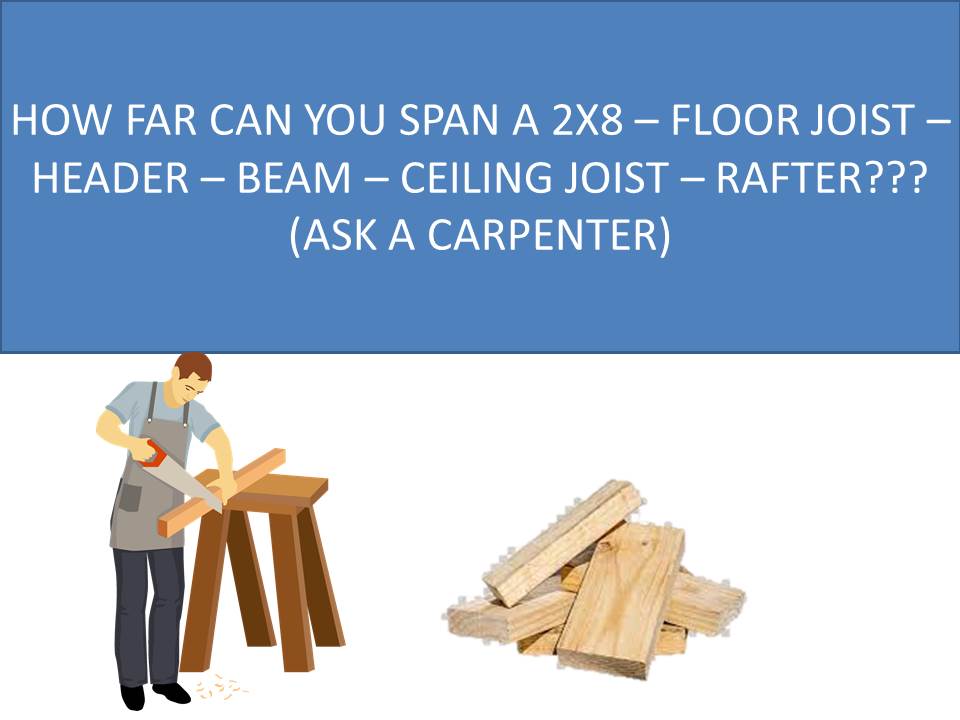Are you taking the plunge of some home remodeling project or are having some kind of extension; you might be interested to know the span for various structures of the framework including Floor Joist. So, if you’re wondering how far you can span a 2×8 Floor Joist; here’s a lead:
Floor Joist are the framework that supports the floors of your home. Knowing how far they can span is essential to making sure the floors is properly supported and safe for use.
In a 2×8 Floor Joist, the letter “8” is pretty important. It’s the depth of the Floor Joist. So, the span of 2×8 can be estimated by a rule of thumb i.e. 1.5 times the depth. So, a 2×8 Floor Joist can span a length of 1.5 x 8 equal 12 feet. But in reality, this span can vary between 7’-1” to 16’-16”.
Span is the maximum distance between two support points that a Floor Joist can stand without buckling or breaking. There are many factors to consider when determining the span of a Floor Joist, including the species of wood, the grade of lumber, the purpose of use, and the load it will bear.
In this blog post, we’ll discuss what factors to consider when determining the span of a 2×8 Floor Joist and how to calculate the length of the Floor Joist. We’ll also discuss different types of arrangements for Floor Joist, including single, double, and laminated veneer lumber (LVL). With this knowledge, you’ll be able to make sure your floors are properly supported and safe for use.
Let’s first start by discussing basics of a span in general:

What is a Floor Joist?
Floor joists are large number of small beams or horizontal members that run between walls or rafter to support the floor or ceiling. They take the dead weight of the structure (subfloor and floor finishes) along with live load of people, furniture, and fu
What is a span?
Span is the measurement of the linear distance a beam, board, rafter, or joist can stand without additional support and without bending or failure. Span is a critical factor when considering how to design and construct the frame a house or building. For Floor Joist, span is affected by several factors, including the size and species of wood, grade of lumber, purpose of use, and load applied to it.
Since, there’re a lot of factors affecting span, International Residential Building Code (IRC), in it’s 2018 edition has specified maximum or allowable span for all elements like joists, beams, headers, and rafters.
Like Us on Facebook!
Understanding the span of a beam is an important factor in determining the strength of a structure. It’s also an important consideration when determining the right type of lumber or beam to use in a construction project or a building.
Subscribe Us on YouTube!
The most common types of Floor Joist used in residential construction are single, double joists, and laminated veneer lumber (LVL).
- How far can you span a 2×8 rafter
- How far can you span a 2×8 floor joist
- How far can you span a 2×8 header
Each type of beam has different span requirements based on the weight and purpose of use. For example, a single Floor Joist can typically span up to less, while a double Floor Joist can typically span more. LVL beams have a higher capacity for span, but the span will vary depending on the weight and purpose of use.
Factors affecting span of a 2×8 Floor Joist
When determining the span of a Floor Joist, there are several factors to consider.
- The species of wood used for the Floor Joist can affect the span length; usually, engineered wood products such as laminated veneer lumber (LVL) and glulam (glued laminated timber) are more resistant to warping and shrinking than other species of wood.
- The depth of the structural element also affects span length; deeper elements are capable of supporting heavier loads over longer distances.
- The grade of the lumber being used for Floor Joist is also important; higher grades have fewer knots, which may affect the strength of the beam.
- Additionally, spacing between Floor Joist affects span length; greater spacing between joists will result in a longer span for the beam.
- The purpose for which the beam is being used also plays a role; for example, floor joists must be able to support the weight of a room’s contents, whereas ceiling joists do not need to bear as much load.
- Finally, the load that the beam must support is a critical factor; heavier loads require beams with greater strength and thus shorter spans.
How far can you span a 2×8 Floor Joist?
For a douglas fir with spacing in center of 12”, the Floor Joist can span 14’-9” but for spacing at 24”; the maximum allowed span is 10’-5”. For southern pine with spacing of 12” you can span the Floor Joist to 15’-10” while with spacing of 24”, the maximum allowed span is 11’-11”. With rederwood or cedars, the spacing for Floor Joist varies between 11’-10” to 14’-11” (with spacing of 24” and reduced to 12”).
Conclusion
So, you see be it a floor joist, deck joist, or rafter; the maximum span allowed varies by the spacing in between the Floor Joist and wood specie you choose. So, it’s best that you have a clear understanding of allowable span limits to build a sturdy structure. Try to select the specie of make first and then consider other factors including load, grade, and spacing of the floor joists to determine how far can you span a 2×4 Floor Joist without additional support.
Also Read:





















